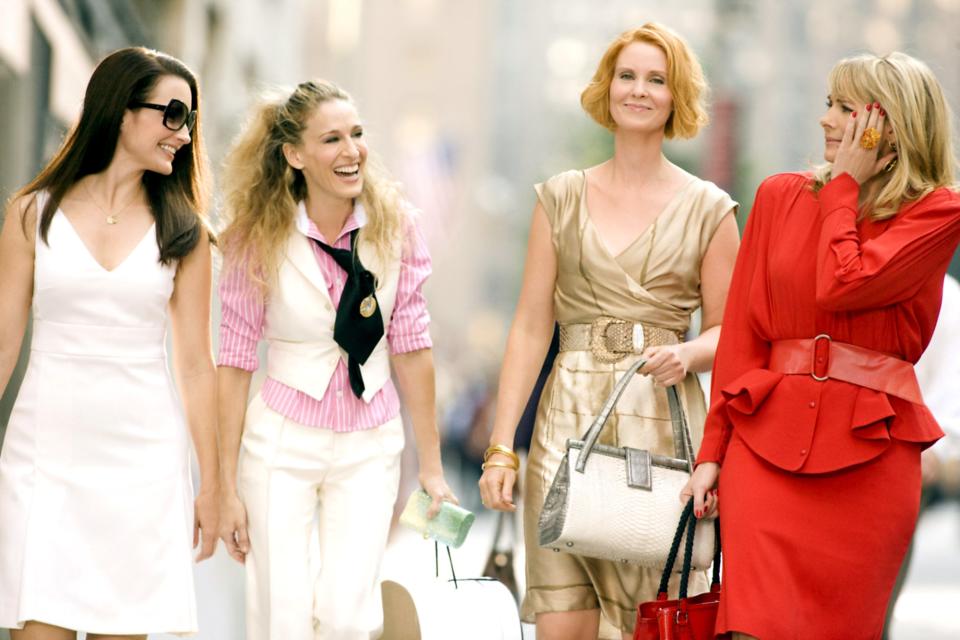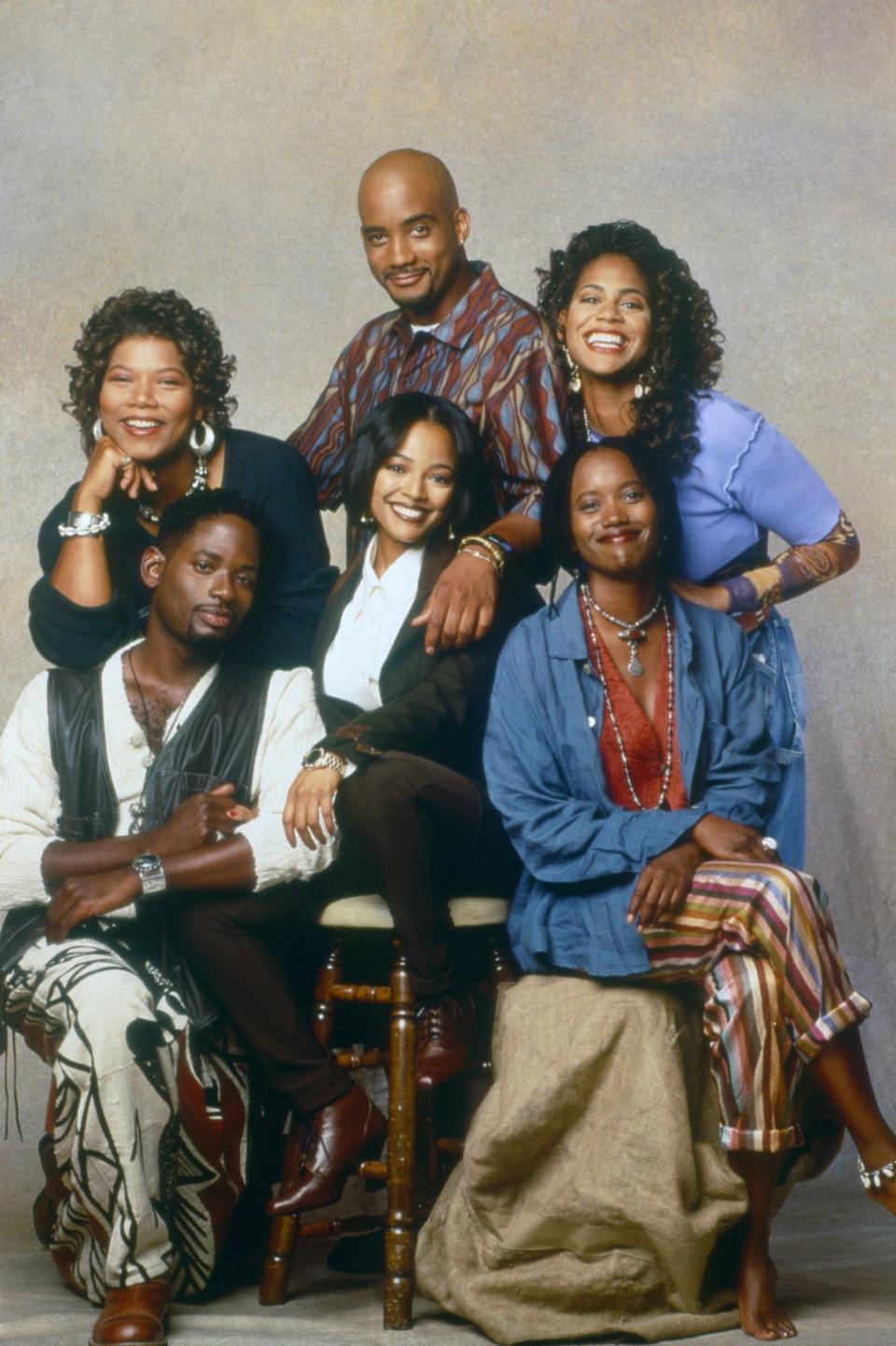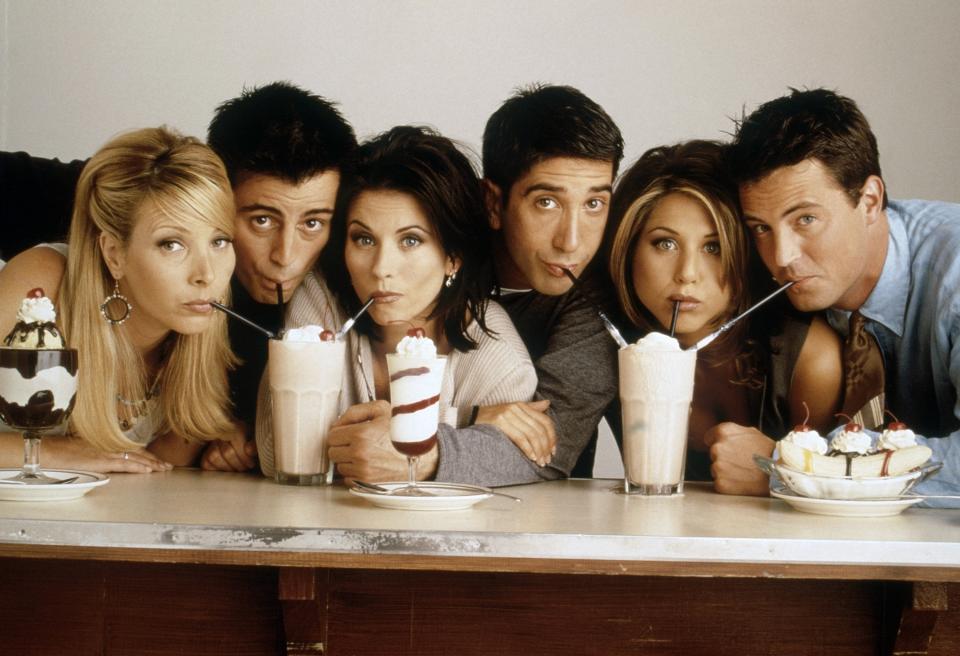Being the Floater Friend Is Not the End of Your Social Life, Actually

- Oops!Something went wrong.Please try again later.
Getty Images (Edited)
In this reported essay, associate editor Aiyana Ishmael explores the phenomenon of being the floater friend, and argues that, despite the position being deemed undesirable by pop culture’s depictions of friendships, it may not be as bad as it seems.
Angela Wei attended four different schools between elementary and middle school while living in Ottawa, Ontario. “I never really had the time to establish a permanent friend group,” says the 23-year-old.
Before starting high school, Wei moved to Vancouver. For the first time, she would be able to plant roots at a new school, on the same playing field as other incoming freshmen; she hoped to form that group connection she had always dreamt about.
“I thought, ‘Finally, I am going to be at this school for all five years,’” she recalls. “I wanted that big friend group — like the ones you see in movies. That idealized friend group seemed like the only way friendships were allowed to operate, it was the only way to have fun.”
At 13, she entered her new all-girl school hoping to propel into the world of inseparable bonds and group chats, reminiscent of the experiences depicted in our favorite young-adult coming-of-age stories. Unfortunately, that was not the case. Instead of sleepover invites and outfit coordination she was met with pre-existing groups no longer taking friendship applications.
“There were already these different friend groups established,” she says. “It then became [a question of] which one do I want to insert myself into? For the first few years of high school, I tried to test out different groups, but no matter how close I got to individual people within them, it always felt like I couldn't get into the core friend group.”

SEX AND THE CITY: THE MOVIE, Kristin Davis, Sarah Jessica Parker, Cynthia Nixon, Kim Cattrall, 2008.
For decades, popular culture has portrayed big friendship groups as a rite of passage, your one chance to be a part of something larger than yourself. There’s Khadijah James and her squad from Living Single. The Central Perk gang from Friends. Massie Block’s Pretty Committee in The Clique novels. John B and his Pogues in Outer Banks. For better or for worse, we’ve been trained to believe that the only right way to experience life in your teens and twenties is with a semi-large, eclectic, and slightly codependent friend group guiding you through it all. It’s something we have all chased — some more than others — and sometimes we never make it to the finish line. Many of us exist along the perimeters of those clusters, between the lines or above the invisible entry point of intimacy, floating from group to group, never fully landing on a homebase.
“I feel like it's so easy to compare everything to shows like Sex in the City,” Margaret Moran, 29, says. “Seeing that representation of people having this core friend group is difficult. Everything centers around that dynamic. They're always hanging out. Then in real life to not necessarily have that, sometimes it makes you feel like you're doing something wrong, even if you're not.”
For as long as friend groups have formed, floater friends have roamed, being forced to exist more as a secondary character to the plot of a larger story, rather than a key player amidst the ensemble. The “invited to the dinner, but not the sleepover” friend. The “come to the party, but not in the same car” friend. The “maybe we’ll invite them to tag along” friend. For many floaters, it’s easy to feel like an afterthought.
“I'm a satellite friend, or sometimes I say I'm a little electron or I'm a moon, not a sun,” Kiki O'Keeffe, 38, says. O'Keeffe describes “sun” friends as those who are effortlessly able to exist as the social gravity of multiple people. They’re equipped with the special skill of bringing large groups of people together.
Dr. Marisa G. Franco is a psychologist, friendship expert, and professor at the University of Maryland who teaches a class on loneliness. At the end of her two courses, she noticed there was a group that was really close and another that wasn’t.
“I was analyzing the difference between these two classes and I saw that in one of my classes, I had a student [named] Savannah who I call an igniter because she would say to everyone at the end of each class, ‘Anyone want to get lunch?’ The igniter creates the group, and now everyone else is more connected because the igniter was able to form that bond.”

TSDLISI EC042
Franco notes that if you’re constantly finding yourself on the fringe of friendships, you might have to be the one to create the group. Oftentimes floater friends have a more passive way of navigating their connections. People who experience this ongoing battle sometimes even manage to compartmentalize their friendships, which leaves them with more individual relationships over friend groups.
“And maybe that’s why you end up becoming a floater friend because you have these very bespoke ways of interacting with people that doesn't really lend itself to forming a group,” O’Keeffe says. “Maybe I’m not the type to say ‘Let’s all buy a cake, coordinate schedules and get together, and have something big and fun.’ It's amazing when those things can happen. I think I've definitely felt envious of that growing up. At different points you're just like ‘Does this mean I don't have as much love in my life? Does that mean my friends do not care about me in the same way?’”
The famous friend group many of us aspire to isn’t always that aspirational, though. While it can get lonely existing as a party of one, for many floater friends, being forced into a governing body with ratified laws of friendship-land can be overwhelming.
“My school was very cliquey and people stayed within their friend groups,” Wei says. “It was also very hierarchical, in the sense that there was always one girl who was the leader and then everyone else had to listen to her and I didn't really vibe with that. I didn't really understand why things were so predetermined.”
O’Keeffe would even go as far to call friend groups tiny “societies.” “Some social sciences probably know what the threshold is, but when you’re in a group at a certain point it becomes a little society, which means you just naturally start to form rules and etiquette,” O’Keeffe says. “Those things you don't need when you're just two or three people. And as you scale, it's very hard to govern and adjudicate things, and it does become a little bit suffocating.”
As an igniter of friend groups myself, I have seen firsthand how draining friend groups can become — especially when you’re 17 and everything feels more momentous than it actually is. It starts with naming the group. You must settle on an acronym that identifies everyone in the squad, even though someone's name will always be last. You must establish rules and parameters surrounding hangouts and invites, as no two members of the larger group can hang out solo without being reprimanded. Back then, it was all for one and one for all. Now, years later, that same high school friend group and I laugh about the system we built to tightly uphold our friendships, and how it isn’t quite realistic as growing adults.
“My best friend today, we don't even live in the same state, but we've been friends for so long and there's no politics,” Wuraola Adeniji, 23, says. “We can hang out whenever we have the time. With my personality I have to create time or space for people that align with me at the moment. Having a friend group, sometimes I'm not in alignment with that. I might be in a different mindset and the expectations of me in that friend group might be too much.”
Rupal Banerjee, 24, remembers the pivotal moment in her childhood where she was shunned to the edges of the group. She was in the eighth grade and her entire class of about 15 students went to Knott’s Berry Farm, the amusement park in California. She agreed that the majority of the group somewhat enjoyed her presence, but the group “leader” didn’t. At the end of the trip, the group leader invited every single person besides Banerjee to go to dinner after their day at the park.

TSDFRIE NB044
“She looked me in my eyes, didn’t say anything and kept walking down, inviting everyone else behind me,” she recalls. “For me it was, I guess, when you're younger, you chase things that are not meant for you because you don't know any better. You just want to feel loved, essentially. And eventually I realized that my absolute best friend in the world was one person and not a whole group of people.”
The schooling years are always the time in which being a floater feels the most detrimental. Who we grab lunch with in between school and work, who we spend time with on the weekends, and who we attend parties and events with can all trigger the stress of belonging. Searching for a sense of community is something we will always pursue as humans, at any age — but, as many of us learn as we grow, we should never force ourselves to fit in a social ecosystem that isn’t also working to make space for us.
“Rather than trying to fit myself into a certain group, I decided to just make friends with people I really liked individually,” Wei says. “By the end of high school, I felt my core group of friends were just people in different friend groups.”
But what do you do if you’ve given your all to a group that still seems to put you on the back burner? You redirect your energy.
“Turn your efforts elsewhere,” Franco says. “I think some of the issues that people have is they don't know when to walk away. They work harder when they find that they're being excluded. When we do that we're then inviting these less reciprocal, less affirming relationships into our lives because we're investing all of our energy into the people that aren't invested in us.”
As we leave our high school hallways behind and start to navigate college, full-time jobs, and the many other social environments life will throw us in, a herd might seem less attractive than impactful and fulfilling individual relationships. Wei says her “floater friend” lifestyle growing up was difficult, but now as a young adult living in New York City, she feels better equipped to keep her individual relationships healthy and strong as opposed to existing in a group in which she never really fosters true, deep connection with each member.
“In high school, having that ‘perfect’ group felt so important,” Wei says. “It was like, ‘I either have this friend group or I don't.’ The moment you get a bit older and start working or going into the world, you meet people, your type of people, and you realize there are so many other people that are better suited to you. Just because the group of a hundred people in your grade in high school aren't necessarily your people, it doesn't mean that you're not going to be able to find them eventually.”
Originally Appeared on Teen Vogue
Want more great Culture stories from Teen Vogue? Check these out:
A New Generation of Pretty Little Liars Takes on the Horrors of Being a Teenage Girl
Underneath Chappell Roan’s Hannah Montana Wig? A Pop Star for the Ages
Donald Glover’s Swarm Is Another Piece of Fandom Media That Dehumanizes Black Women
On Velma, Mindy Kaling, and Whether Brown Girls Can Ever Like Ourselves on TV
Gaten Matarazzo Talks Spoilers, Dustin Henderson, and Growing Up on Stranger Things
How K-pop Stars Are Leading Mental Health Conversations for AAPI People and Beyond
Meet the Collective of Philly TikTokers Making You Shake Your Hips
The Midnight Club Star Ruth Codd Isn’t Defined By Her Disability

